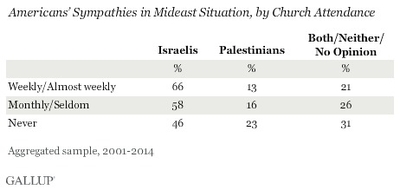How Church Attendance Affects American Attitudes toward Israel
What role does religion play in American attitudes towards Israel? An analysis by Frank Newport, the editor-in-chief of Gallup Inc., reviews 14 annual Gallup polls from 2001 to 2014 in which respondents answer the same question, "In the Middle East situation, are your sympathies more with the Israelis or more with the Palestinians?" The numbers offer insights different from what one might expect.
The study starts with two basic facts: First, looking at the whole sample of about 14,000 American adults, 59 percent answer that they have more sympathy for Israelis and 16 percent say they have more sympathy for Palestinians, a ratio of almost 4-to-1. Second, Newport finds that "Religious Americans are significantly more likely than less religious Americans to be sympathetic to the Israelis," confirming what common sense already tells us.
That said, his numbers contain several noteworthy subtleties:
-A near-linear relationship exists between church attendance and outlook: 66 percent of weekly or almost-weekly church goers favor Israel, as do 58 percent of monthly and seldom church-goers and 46 percent of never church-goers. Conversely, sympathy toward the Palestinians is also near-linear: 13 percent, 16 percent, and 23 percent, respectively.
-In both cases, any church attendance at all makes Christians more alike to each other vs. those who never attend, a difference that has somewhat widened recently.
